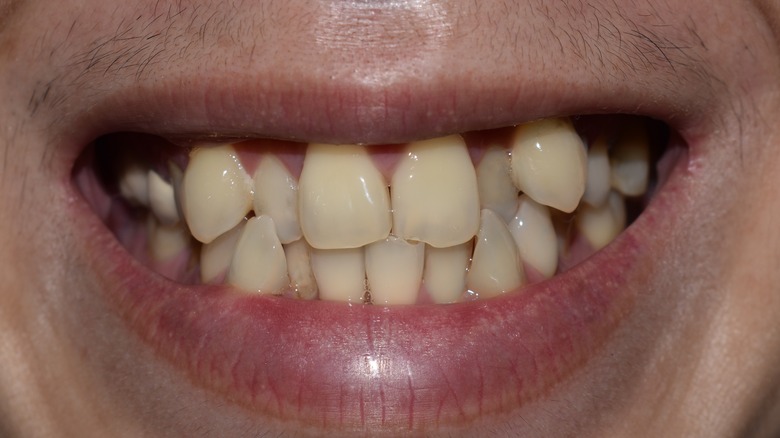What Happens If You Don't Wear Your Retainer?
Retainers serve as a follow-up to dental braces — once your teeth have straightened out and you no longer need the metal contraption, your orthodontist will fit you for a retainer to ensure your teeth don't shift back, as explained by the Cleveland Clinic. Just because your teeth have aligned as desired doesn't mean they will stay that way forever as various factors play into their ability to stay straight, including the positioning of your gums and jaw muscles and how they move when you chew food. Depending on your preferences and the recommendation of your orthodontist, you'll either walk away with a fixed retainer that stays in your mouth 24/7 or a removable one that you wear at night.
Georgetown Orthodontics points out a few advantages of using a retainer that goes beyond simply maintaining the new alignment of your teeth. For starters, you won't be as susceptible to unconscious clenching of the teeth and jaw, which is a common occurrence after removing braces. This goes a long way in preventing damage from teeth grinding and keeping potential headaches at bay. Wearing a retainer also prevents you from developing tongue thrust (pushing the tongue forward against the teeth), which can ruin all the work you put into straightening your teeth.
You may acknowledge that there are many benefits to wearing your retainer, but could also be wondering if it would be that bad to skip uses or stop incorporating it into your dental hygiene routine altogether. Here's what we know.
Not wearing your retainer may ruin your straight smile
Fortunately, WebMD spoke with various orthodontists to find out what would happen if one stops wearing their retainer. Vick Gupta, from Gupta Orthodontics, doesn't sugarcoat the consequences: "Not wearing retainers can lead to relapse in our teeth positions—meaning they tend to go back to their starting position." Gupta adds that the teeth are most susceptible within the first year after braces have been removed.
While you may not be bothered by a slight shift in your teeth, periodontist Mahnaz Rashti warns that this might not be the end of the story. "Another consequence of neglecting to wear retainers is that the teeth may shift into a position worse than before," Rashti says. This could mean that you just threw hundreds to thousands of dollars down the drain or could even need another round of braces to correct the issue.
At this point, you're probably no longer considering ditching your retainer, but if you still have doubts, Shirck Orthodontics outlines the series of events that can take place in the first weeks, months, and years following the removal of braces if a retainer is not used. In the first week, you'll notice some gaps appearing between your teeth. After a month, corrections to your bite will reverse, meaning that overbite will start to make its presence known again. And following a year, your teeth will begin shifting toward one another, leading to unsightly crowding that will only get worse over time.


